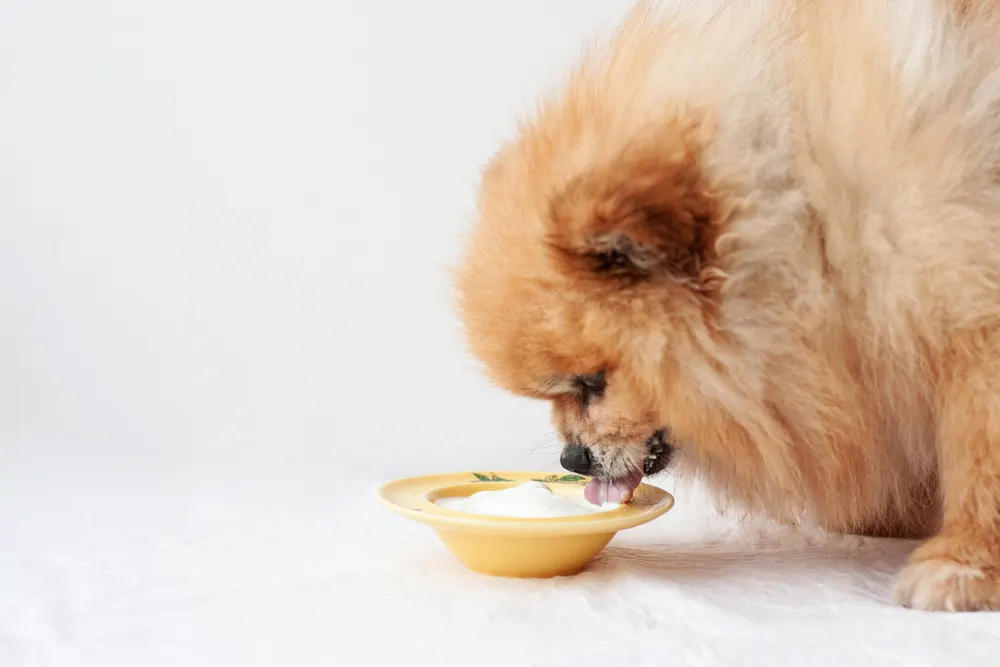Medically Reviewed by Dr. Majid Tanveer, DVM
Are you concerned about the health of your dog’s breath? Bad breath, or halitosis in dogs, can indicate underlying tooth and gum disease.
As a veterinarian and lifelong dog owner, I understand that bad breath can be an off-putting problem for many of our furry friends.
The good news is that there are several natural remedies available to help combat this issue.
Natural remedies for bad breath may include coconut oil, fruits and vegetables, parsley, mint, and yogurt. Other remedies may include providing dental chews or treats, brushing your dog’s teeth regularly, and providing plenty of fresh water.
Let’s take a closer look at some of the natural remedies you can use to help keep your dog’s breath smelling fresh.
Bad Breath in Dogs – What to Do
Bad breath in dogs is an unpleasant odor from the mouth that various factors, such as poor dental hygiene, diet, and underlying health conditions, can cause.
When food particles remain in your dog’s mouth, they ferment and create an unpleasant odor. Excessive salivation or drooling can also contribute to bad breath, as saliva contains proteins and enzymes that can break down into smelly molecules over time.
If your dog has persistent bad breath despite regular brushing and dental care, it could indicate a more serious underlying health problem that needs to be addressed.
Natural Remedies for Treating Dog Bad Breath

Natural remedies for bad breath in dogs are often preferable to medicinal options. Medicines may have unwanted side effects and be expensive and inconvenient.
On the other hand, natural remedies can be easily incorporated into your dog’s diet and don’t require a prescription from a vet.
As a professional veterinarian, I always recommend natural remedies to combat bad breath in dogs. Here is a list of 11 natural remedies that can help improve your dog’s breath:
1. Coconut Oil
Coconut oil is great for keeping your pet’s breath fresh due to its potent antibacterial properties. It also provides essential fatty acids – beneficial for a healthy coat and skin.
It can be mixed into your dog’s food or applied directly to his teeth and gums for a pleasant-smelling alternative to oral care products loaded with chemicals.
2. Crunchy Fruits and Vegetables
Fruits and vegetables contain natural enzymes that help to freshen a dog’s breath. Certain crunchy fruits can help remove plaque buildup as they act as a natural toothbrush for your pup, such as:
- Apples
- Pears
- Carrots
They are also rich in essential vitamins and minerals that provide nutrients for a dog’s overall health. Mixing these into your pup’s food can add flavor and nutrition for improved fresh breath.
Give your pup an extra punch of fresh breath with a fruit or veggie snack in the morning and evening. One way to give your dog fruits and vegetables is to chop them into small pieces and add them to their regular meals.
3. Breath Freshening Parsley
Parsley is a safe, natural ingredient that can be used regularly to help reduce bad breath in dogs and keep their mouths healthy.
Fresh parsley is packed with:
- Chlorophyll: An antioxidant that helps fight bacteria in the mouth and freshens a pup’s breath
- Natural enzymes: Act as an anti-inflammatory and help reduce bacteria and plaque buildup, which are the leading causes of bad breath in dogs.
- Vitamins: Vit. A and C can help improve overall dental hygiene.
Simply add some freshly chopped parsley to your pup’s food or serve it as a snack.
You can also make a homemade breath freshening spray by combining fresh parsley and water in a blender before straining it into a spray bottle. Spray your pup’s mouth and gums directly with the mixture to help freshen their breath naturally.
For an extra treat, you can add a few sprigs of fresh parsley to your pup’s kibble for an added breath-freshening benefit.
4. Refreshing Mint For Bad Breath
Mint is well-known for its breath-freshening properties and can help naturally improve your dog’s breath.
Fresh mint leaves contain:
- Essential oils: Fight bacteria and reduce bad breath.
- Menthol: Acts as an antiseptic, helping to keep your pup’s teeth and gums healthy.
- Strong aroma: Helps to cover up any unpleasant smells coming from your pup’s mouth
You can give your pup fresh mint leaves to chew on or add some freshly chopped leaves to his food.
You can also make a homemade breath-freshening spray by combining a few mint leaves with water and straining it into a spray bottle. Spray the mixture directly onto your pup’s gums and teeth to boost minty freshness.
Additionally, using mint-flavored toothpaste when brushing your pup’s teeth is another way to help reduce bad breath while providing extra protection from bacteria accumulation.
5. Probiotic or Yogurt to Balance Bacteria in the Mouth

Probiotics and yogurt can help balance the bacteria in your pup’s mouth, essential in fighting bad breath.
Probiotics are beneficial bacteria that help keep harmful bacteria under control and reduce bad breath. Yogurt contains:
- Probiotics
- Lactic acid
- Calcium and
- Vitamins
You can give your pup probiotic supplements or plain yogurt, an easy way to help maintain a healthy bacterial balance in their mouth.
Also, look for dental treats and chews that contain probiotics or yogurt, as these can be great tasty snack that helps your pup’s breath smell better.
6. Lemon Juice To Combat Halitosis
The acidic properties of lemons help combat bacteria and neutralize foul odors caused by plaque and tartar. Plus, lemon juice adds a pleasant aroma to your pup’s breath.
You can add a few drops of freshly squeezed lemon juice to your pup’s water bowl, mix it with honey, and give it to him.
You should also consider adding some fresh lemon juice to his food, as this will help to reduce odors and freshen his breath.
7. Apple Cider Vinegar to Neutralise Bad Smells
Apple Cider Vinegar is a powerhouse of health benefits with its natural Malic and Acetic acids that kill bacteria, plus it contains essential minerals such as:
- Calcium
- Potassium
- Magnesium
It’s also known for its ability to reduce bad breath, as it helps to neutralize the odor-causing bacteria in the mouth.
Add a teaspoon of apple cider vinegar to your pup’s water bowl daily for health benefits.
You may add some drops of apple cider vinegar to their food or make a homemade breath-freshening spray by combining it with water and spraying directly onto their gums and teeth.
8. Homemade Dental Chews & Treats To Reduce Plaque Buildup
Dental chews and treats are an excellent way to help reduce plaque buildup while freshening your pup’s breath.
Specialized dental chews and treats contain ingredients that help break down plaque on the teeth and gums, reducing bad breath.
You can make your dental chews and treats at home with oatmeal, ground flaxseed, applesauce, peanut butter, honey, coconut oil, parsley, or plain yogurt.
Be sure to include high-fiber ingredients in the recipe, as they help reduce plaque buildup by scraping away surface bacteria.
9. Use Aloe Vera to Combat Dog Bad Breath Causes
Aloe vera is used by many people as a beauty product and can be beneficial to your pup, too. Its anti-inflammatory and antibacterial properties make it an excellent choice for treating bad breath in dogs.
To use aloe as a treatment, you can make a solution using the following:
- Aloe vera gel (one part)
- 3% Hydrogen peroxide (one piece)
This cleaning solution can help to break up and remove tartar and plaque build-up, as well as freshen the dog’s breath. Ensure you do not use the yellow layer of aloe vera, as this is toxic for dogs.
Additionally, hydrogen peroxide can help to provide a slight bleaching effect, resulting in brighter teeth.
10. Regular Teeth Brushing To Remove Bacteria and Food Debris
Regular teeth brushing is one of the most effective ways to fight bad breath in dogs. It helps to remove the following:
- Bacteria
- Food debris
- Plaque
Regular brushing of teeth helps keep your pup’s gums healthy and prevents the buildup of tartar, which can cause gum disease and even worse breath.
How to properly brush your pup’s teeth: You’ll need a special canine toothbrush and toothpaste. You should brush your pup’s teeth at least once or twice a week if plaque buildup is a problem.
You can also use dental wipes or swabs to help remove plaque and freshen your pup’s breath between regular brushing sessions.
11. Fresh Water Intake to Keep the Mouth Moisturized
Giving your pup plenty of fresh, clean water will help to keep the bacteria in their mouth at bay and prevent dryness that can lead to bad breath.
You can give your pup a bowl of fresh water throughout the day or add some ice cubes to make it more interesting.
You can also give your pup some wet dog food, which contains more moisture than dry kibble and help keep them hydrated.
Pet Care Tip: Check out this informative video that reveals how you can make delicious homemade treats with the power of mint.
Further Reading: To learn more about bad breath in dogs and its causes, read our article Why Does My Dog’s Breath Smell So Bad.
Dog Lovers Also Ask
What Are the Causes of Bad Breath in Dogs?
Bad breath in dogs can be caused by various factors, including dental disease, digestive issues, or even eating certain types of food. Poor oral hygiene is the most common cause of halitosis (bad breath).
Can I Use Human Toothpaste On My Dog?
No, you should not use human toothpaste on your dog. Human toothpaste contains high amounts of sodium and xylitol, which can be toxic for dogs if swallowed. Therefore, it is essential to use toothpaste specifically designed for dogs.
What Foods Cause Bad Breath In Dogs?
Certain foods can lead to bad breath in dogs, particularly those high in sugar (carbohydrates) and protein. Foods such as garlic, onions, fish, coffee, and dairy can also cause bad breath in dogs.
